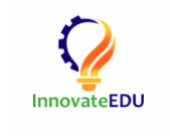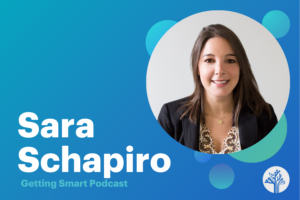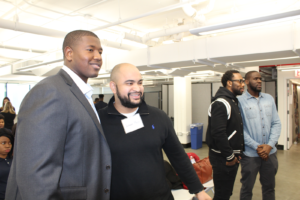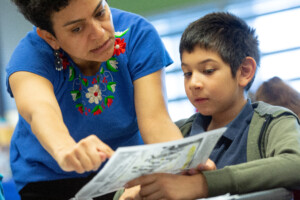A Lifeboat in an Education Crisis: Supporting Educators through Inclusive Actions
Key Points
-
Prioritize work-life balance! Use the tools that amazing organizations, like EALA’s 100 partners, are creating to support you and your students.
-
Teach to the variability of each and every learner. They are worth it.
-
Savor every sweet moment. Even though it can feel overwhelming at times, remember to have fun and take joy in the little victories.

By: Treah Hutchings
After five years, I left the classroom I had spent my career building. I felt forced to choose between supporting students and supporting myself.
This is the reality of many educators across the country, as they feel the pressure to ensure quality education is provided for students, while also maintaining their own well-being.
After I left, I began searching for ways to continue to support struggling students—and the teachers like me, treading the waters of the system—to help provide a lifeboat, of sorts. Then, I joined the efforts of the Educating All Learners Alliance (EALA for short), a coalition of over 100 organizations formed as a result of the pandemic and the transition to remote learning, which continues to serve as a hub for educators, administrators, and vendors alike to find best practices to support all students, especially students with disabilities.
As many educators know, when we support the differentiation of learners and value the unique experience of each individual learner, all students benefit. During my time in the classroom, I worked in school districts that provided a curriculum as well as districts that did not. Even with a pre-written curriculum or lesson I had used before, even if I taught that same lesson in both the first and second period, I still needed to shift and adjust my lessons to meet the varying needs across my many students. I often felt alone in this venture against the wave of students who needed diverse support in my classroom.
Inclusive, lesson planning tools shared through EALA’s Resource Library, such as the 5/15/45 tool by CAST and the TIES Center, would have felt like a liferaft. This specific 5/15/45 tool provides educators, no matter what stage they are in the planning process, with structured increments of support to incorporate inclusive strategies into the lessons they’re building. I, and my students, would have loved this support!
And though this one resource may have been metamorphic for increasing inclusive practices and using time efficiently, there are other waves of barriers and obstacles in classrooms across the country.
At the time, I didn’t know of a hub—for free information at least—that educators could go to, and trust, when looking for resources that support the variability of learners, like students with disabilities or learning differences. How do you shift and support a new student in your classroom who learns in a way that is different than you have ever taught, for instance? In my second year of teaching, I had an 8th-grade student who was visually impaired. She was an amazing student and advocate for herself and taught me so many strategies that supported her diverse learning. But what about the students who don’t yet know what works for them? Rather than scrolling through Google, sifting through the myriad of both trustworthy and untrustworthy articles and resources, EALA offers the Resource Library.
I am so excited that I now have the time to help curate and vet resources within the Resource Library, which contains just over a thousand curated pieces of content aimed to support a positive, and inclusive, learning environment for all students. A thousand resources focused on supporting students with disabilities and learning differences in a variety of learning environments (remote, hybrid, or in person) may sound like a lot, but we have filters of audience, grade level, topic area, disability category, resource type, and theme. These filters, and the search function, help educators navigate to resources that meet their specific needs.
I found my boat in the storm with the Educating All Learners Alliance. Now I want to share this support with as many educators as possible.
Treah Hutchings
For example, I could search “SEL” and filter results to incorporate the theme “intersectional needs and considerations,” and my search goes from seven pages to four resources. Within these filtered results, I see Our Unique Identities: Facilitation Guide and Posters, a resource developed by an EALA working group. This resource was created by experts with our EALA partner organizations to provide guidance on creating space for real-life, classroom conversations (to a variety of student levels) about intersectional identities. Another resource that came up on this search was a case study, The Opportunity For Stronger Connection to Your School Community, by high school special education teacher, Kareem Neal. In this case study, he discusses the online tools and strategies he used to connect with his students during remote instruction amidst the stay-at-home orders of the pandemic.
So EALA has the Resource Library, which provides resources from case studies, to resource compilations, to strategies that you can use today in the classroom. We have EdWebinars and the EALA podcast for those morning drives or walks after work (very important) that range from 5 minutes to 30 minutes… but what about digital learning?
I had the opportunity, like so many others, to teach during the storm that was March 2020–completely remote. No warning. No clear end date. Luckily, my students had individual Chromebooks. Luckily, I had already integrated technology and digital learning even when inside the physical classroom.
I would have loved to have the EALA Tech Tool Library, though. The Tech Tool Library holds accessibility information for the most popular edtech products educators use. I used tools like these in my classroom, and since then, digital tools have expanded even more. What I didn’t do at the time (which I know better now) was search through the settings and website subpages to find the accessibility information. At the time, my students often found these features on their own, which was great! But what about those who didn’t? What if my students were hybrid or remote and they didn’t know? What about those who were struggling academically or as unidentified recipients of IEPs; could these supports have changed things?
EALA’s Tech Tool Library puts this information all in one place. Simply click on a tool and see accessibility information, as well as (if available) supportive articles surrounding accessibility implementation all at once. Alongside the most popular edtech tools that educators are already using in their classrooms, are tools that educators may not already know about but support inclusivity across classrooms. One such tool is Along, a digital reflection tool designed to help educators make each student feel seen and understood. It lets students share reflections (in a variety of forms) directly with their teacher through a digital platform. It even has sample prompts to help educators and students get started. And, Along is accessible to all learners. Tools like Along can serve as a rope of connection for students, or a life jacket for educators–who struggle in the waters of communication and relationship building—activities we know are vital to an inclusive classroom.
I found my boat in the storm with the Educating All Learners Alliance. Now I want to share this support with as many educators as possible. The best part: EALA does not just keep educators and students merely above water; it has the life jackets and ropes of connectivity with a team of sailors working, like me, to propel innovative ideas forward. I am excited to continue collaborating with educators, listening to their success and challenges, and working within the alliance to find creative solutions.
Three Tips to Consider:
- Prioritize work/life balance! Use the tools that amazing organizations, like EALA’s 100 partners, are creating to support you and your students.
- Teach to the variability of each and every learner. They are worth it. And, free tools like the 5/15/45 tool and Along will help use less of your precious time.
- Savor every sweet moment. Even though it can feel overwhelming at times, remember to have fun and take joy in the little victories.
Treah Hutchings taught 7th and 8th grade English in Kansas City and Dallas, Texas. She is currently the Special Education Project Manager at InnovateEDU for the Educating All Learners Alliance.








0 Comments
Leave a Comment
Your email address will not be published. All fields are required.